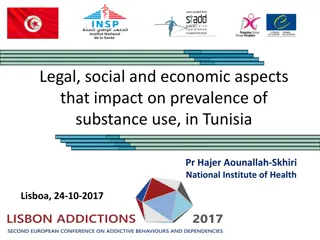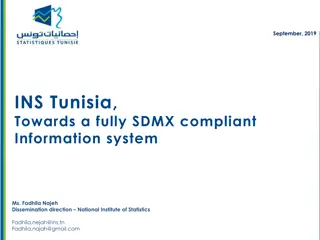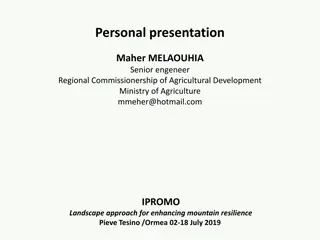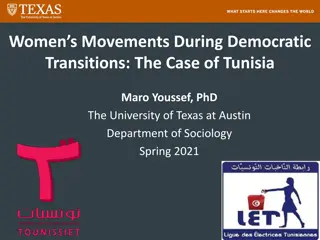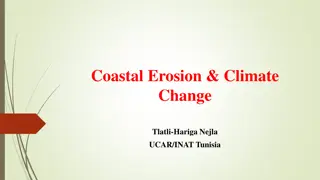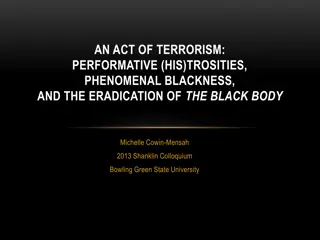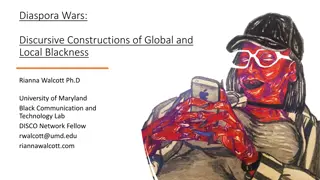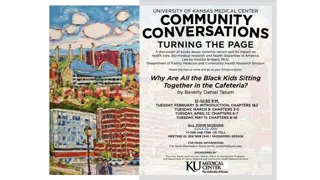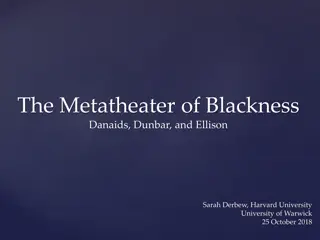Exploring the Social Construction of Blackness in Tunisia
Shreya Parikh, a Dual Ph.D. candidate, delves into the social construction of Blackness in Tunisia through a comprehensive research project focusing on social imagination, racialization based on skin color, and processes of contestation. The study aims to unravel the intersections of race, ethnicity, citizenship status, Muslimness, gender, and social class in shaping perceptions of Blackness. By conducting qualitative data collection in various regions of Tunisia, the research seeks to shed light on the lived experiences of Black Tunisians and Sub-Saharan African migrants in challenging racialization dynamics.
Download Presentation

Please find below an Image/Link to download the presentation.
The content on the website is provided AS IS for your information and personal use only. It may not be sold, licensed, or shared on other websites without obtaining consent from the author. Download presentation by click this link. If you encounter any issues during the download, it is possible that the publisher has removed the file from their server.
E N D
Presentation Transcript
Conceptualizing Blackness in/through Tunisia Shreya Parikh Dual-Ph.D. candidate, Department of Sociology at UNC Chapel Hill and CERI - Sciences Po Paris
The social construction of Blackness in Tunisia The goal of my dissertation research project is to understand 1. The social imagination of Blackness 2. The racialization of individuals based on skin-color (among other phenotypic traits) 3. The contestation of this racialization Shreya Parikh GRRI 2021
The social construction of Blackness in Tunisia My research is motivated by the following research questions: 1. What are the social imaginations linked with blackness? 2. What roles do other ethno-racial identities (like Arab and Amazigh), citizenship status (migrant versus citizen), ideas related to Muslimness, gender, and social class play in the making of the social construction of blackness? 3. What are the key sites or interactions where racialization is experienced? 4. How is racialization experienced, interpreted, and challenged by Black Tunisians and Sub-Saharan African migrants? Shreya Parikh GRRI 2021
Methodology My dissertation relies primarily on multiple types of qualitative data collected through intensive fieldwork (2020-22) in Tunisia. This includes semi-structured interviews, direct and participant observation, and focus-group data. In addition, I will also collect journalistic pieces, public social-media posts, and cultural material (like films, music, theatre pieces) that represent ideas of blackness as present in the Tunisian society. Shreya Parikh GRRI 2021
Key sites where interview and observation data will be collected: 1. Tunis (capital; Anti-racist organizations) 2. Sousse-Monastir (Sub-Saharan African students in universities) 3. Sfax (undocumented migrants from Sub-Saharan Africa) 4. Gabes-Medenine-Kebili (governorates with significant Black Tunisian population)
Methodology As a GRRI Project Launch Fellow, I spent the year 2020-21 in Tunisia collecting qualitative data (including interviews, notes from informal conversations, and observation data). The pandemic-related constraints meant that I focused on collecting observation and media data for a significant part of the year. I was also able to interview key activists and civil society members in Tunis. The collected exploratory data has allowed me to reframe my research questions. These will guide data collection over the next academic year. Shreya Parikh GRRI 2021
Translating Blackness The term blackness , in the context of this study, denotes a multitude; it denotes the state of being Black, of the identities and experiences of Black people, and the expression of these identities and experiences (through art, for example). Source: https://www.aa.com.tr/fr/afrique/tunisie-des-%C3%A9tudiants- subsahariens-manifestent-contre-le-meurtre-d-un-ivoirien/1348552 Shreya Parikh GRRI 2021
Translating Blackness Scholar-activist Huda Mzioudet (2018) has suggested the use of adjective as a proximate to the idea of blackness. She has argued against the use of other terms like / which mean brown or tanned , a term that is recurrently used by Tunisians to indicate a Black person in a politically correct manner. For Mzioudet, the latter is a mischaracterization of blackness and Black people. Shreya Parikh GRRI 2021
Situating my research In order to break away from US-centric discourses on blackness, which itself is theorized and mediated by the US empire (Garc a-Pe a 2015), and the association of blackness with the Black-white binary (also coming from the theorization of blackness in the US), I engage with the global study of racialization, especially with that produced by/on the Global South. Shreya Parikh GRRI 2021
Situating my research I engage with studies of caste systems in South Asia (Beteille 1990; Dumont 1980; Moffatt 1979; Rao 2009), as well as colorism and m tissage in Latin America (Andrews 2010; Degler 1971; Gudmundson and Wolfe 2010; Paredes 2018; Sue and Sue 2013; Telles 2004, 2014) and the Caribbean (Bahadur 2015; Garrigus 2006; Giraud 2004; Glissant 2001). Shreya Parikh GRRI 2021
Situating my research The discourse linking blackness with Africanness at a global level, especially in the African diaspora, generates a social imagination of a homogeneous Africa. To highlight the heterogeneity as well as the particularity of the experiences of different ethnic or national groups, I engage with the literature on racialization in various parts of Africa, including Ghana (Pierre 2012), South Africa (Marx 1997; Posel 2001), and Zimbabwe (Hughes 2010). Shreya Parikh GRRI 2021
Situating my research I build upon the emerging field of study of blackness in contemporary MENA region, especially in Tunisia. In Tunisia, this includes the works of scholar-activists Maha Abdelhamid (Abdelhamid 2018; Abdelhamid, Elargi, and Elwaer 2017; Abdelhamid and Hamrouni 2016), Afifa Ltifi (2020), and Huda Mzioudet (2020); and scholars Ines Mrad Dali (2005, 2015), Stephanie Pouessel (2012b, 2012a), and Marta Scaglioni (2017, 2020). Source: https://nawaat.org/2014/03/21/tunisie-deni-de-racisme-ou- banalisation/ Shreya Parikh GRRI 2021
Who is considered Black in Tunisia? Those who are perceived as having Sub-Saharan African-origins, but who (in reality) may or may not have direct ancestry in that region, come to be racialized as Black. Both phenotypically darker Tunisians (many originating from southern Tunisia) and Sub-Saharan migrants (including guest workers, transit migrants, students, and diplomats, among others) come to be racialized as Black. Given that slavery was practised in Tunisia (prior to abolition in 1846), many Black Tunisians are descendants of slaves. This history plays into racialised ideas (like being submissive or fit for work as servant) of Black individuals. Shreya Parikh GRRI 2021
Who is considered Black in Tunisia? Estimates that have been recurrently quoted by Black Tunisian activists as well as in journalistic pieces indicate that around 15 percent of the Tunisian population is Black. Yet, this number remains disputed. Black is not a stable category. The racialization of an individual depends on the context in which she finds herself in. For example, someone who is considered dark-skinned or Black in Tunis might not be perceived in the same way in Gab s. Shreya Parikh GRRI 2021
Who is considered Black in Tunisia? The Tunisian state does not collect ethno-racial data in the census, hence making it difficult to provide exact numbers of Black Tunisians. While many Black Tunisian activists continue to push the Tunisian state to collect this type of census data, the question remains how does one define Black as a stable category? As many of my interlocutors have pointed out, if we were to define Black using the one drop rule as present in the United States, the whole of Tunisian population would be considered Black. Shreya Parikh GRRI 2021
Arabness-Muslimness-Blackness The link between Arabness, Muslimness, and Blackness (all three of which I see as racialized identities) has driven my curiosity throughout this research. Before arriving in Tunisia, I had hypothesised that Blackness is constructed in opposition to Muslimness in Tunisia. What I have come to realise through interviews and observations here is that the link between Blackness and Muslimness is mediated through ideas of Arabness. Shreya Parikh GRRI 2021
Arabness-Muslimness-Blackness One key reflection from interviews is that Arabness and Muslimness are imagined as synonymous, especially among groups who face marginalization in the society (like atheists, LGBTQ individuals, etc). Shreya Parikh GRRI 2021
Arabness-Muslimness-Blackness While many Tunisians deny the link between the Tunisian identity and Arab identity, many non-Black Tunisians would indicate, with a certain sense of pride, that their last names are of Arab-origin, signifying Arab ancestry. Their narratives about the genealogies of their families would deny the high probabilities of mixed marriages between their Arab ancestors and Amazigh groups in North Africa. Hence, Arabness, Muslimness, and Tunisianness are constructed as overlapping identities. Shreya Parikh GRRI 2021
Arabness-Muslimness-Blackness Blackness as a racialized and marginalized identity is, like other marginalized identities, constructed in opposition to Tunisianness. A recurrent example of this is that most Black Tunisians whom I interviewed mentioned that many non-Black Tunisians perceive them as non-Tunisians. Many of my Black Tunisian interlocutors mentioned that they passed for someone from central Africa and the assumption was that they didn t speak Tunisian Arabic. This meant that non-Black Tunisians spoke with them in French or English, and (in some cases) they would make racist remarks in Tunisian Arabic with the assumption that the person they were commenting about was not Tunisian and didn t speak Arabic. Shreya Parikh GRRI 2021
Concluding remarks Ideas of Arabness and Muslimness indicate the presence of social imagination of the Arab world as homogeneous. This social imagination exists both within and outside this region seen as the Arab world. The study of Blackness in the region is one way to put to question this dominant social imagination. Shreya Parikh GRRI 2021
Works cited Abdelhamid, Maha. 2018. Les noirs tunisiens apr s la r volution de 2011 - Retour sur les pr mices d un mouvement contre le racisme. Euromesco Policy Brief. 84. Barcelona, Spain: EuroMeSCo. Abdelhamid, Maha, Amel Elargi, and Moutaa Amin Elwaer. 2017. Etre noir, ce n est pas une question de couleur : Rapport d enqu te: les repr sentations du racisme chez les noirs de Tunisie. Ariana, Tunisia: Nirvana. Abdelhamid, Maha, and Mansour Hamrouni. 2016. L mergence du mouvement des jeunes Noirs contre le racisme en Tunisie apr s la r volution du 14 janvier 2011. P. 17 in La constitution de la Tunisie: Part 3. Tunisia: UNDP. Andrews, George Reid. 2010. Blackness in the White Nation: A History of Afro-Uruguay. Univ of North Carolina Press. Beteille, Andre. 1990. Race, Caste and Gender. Man 25(3):489 504. doi: 10.2307/2803715. Degler, Carl N. 1971. Neither Black Nor White: Slavery and Race Relations in Brazil and the United States. Univ of Wisconsin Press. Dumont, Louis. 1980. Homo Hierarchicus: The Caste System and Its Implications. Chicago and London: University of Chicago Press. Shreya Parikh GRRI 2021
Works cited Garc a-Pe a, Lorgia. 2015. Translating Blackness. The Black Scholar 45(2):10 20. doi: 10.1080/00064246.2015.1012993. Garrigus, J. 2006. Before Haiti: Race and Citizenship in French Saint-Domingue. Palgrave Macmillan US. Giraud, Michel. 2004. Racisme Colonial, Ethnicit et Citoyennet . Les Le ons Des Exp riences Migratoires Antillaises et Guyanaises. Caribbean Studies 32(1):161 83. Gudmundson, Lowell, and Justin Wolfe. 2010. Blacks and Blackness in Central America: Between Race and Place. Duke University Press. Hochman, Adam. 2019. Racialization: A Defense of the Concept. Ethnic and Racial Studies 42(8):1245 62. doi: 10.1080/01419870.2018.1527937. Hughes, D. 2010. Whiteness in Zimbabwe: Race, Landscape, and the Problem of Belonging. Springer. King, Stephen J. 2019. Black Arabs and African Migrants: Between Slavery and Racism in North Africa. The Journal of North African Studies 0(0):1 43. doi: 10.1080/13629387.2019.1670645. Ltifi, Afifa. 2020. Black Tunisians and the Pitfalls of Bourguiba s Homogenization Project. Project on Middle East Political Science. Retrieved June 17, 2020 (https://pomeps.org/black-tunisians-and-the-pitfalls-of-bourguibas-homogenization-project). Shreya Parikh GRRI 2021
Works cited Marx, Anthony W. 1997. Making Race and Nation: A Comparison of South Africa, the United States, and Brazil. Cambridge University Press. Moffatt, Michael. 1979. An Untouchable Community in South India: Structure and Consensus. Princeton University Press. Mrad Dali, In s. 2005. De l esclavage La Servitude: Le Cas Des Noirs de Tunisie (From Slavery to Servitude: Blacks in Tunisia). Cahiers d tudes Africaines 45(179/180):935 55. Mrad Dali, In s. 2015. Les mobilisations des Noirs tunisiens au lendemain de la r volte de 2011: entre affirmation d une identit historique et d fense d une cause noire . Politique africaine n 140(4):61 81. Mrad-Dali, Ines. 2009. Identit s multiples et multitudes d histoires: les Noirs tunisiens de 1846 aujourd hui. Th se doctorat, cole des hautes tudes en sciences sociales, Paris, France. Mzioudet, Huda. 2018. : UltraTunis.7 June. Mzioudet, Huda. 2020. tre Noir Dans l Afrique Du Nord et Le Moyen-Orient. July 23. Oualdi, M hamed. 2020. A Slave Between Empires: A Transimperial History of North Africa. Columbia University Press. Shreya Parikh GRRI 2021
Works cited Pouessel, St phanie. 2012a. Les marges renaissantes : Amazigh, Juif, Noir. Ce que la r volution a chang dans ce petit pays homog ne par excellence qu est la Tunisie. L Ann e du Maghreb (VIII):143 60. Pouessel, St phanie, ed. 2012b. Noirs Au Maghreb: Enjeux Identitaires. Paris, France et Tunis, Tunisie: IRMC et Karthala. Rao, Anupama. 2009. The Caste Question. Berkeley: University of California Press. Scaglioni, Marta. 2017. I Wish I Did Not Understand Arabic! Living as a Black Migrant in Contemporary Tunisia. doi: 10.14672/67056040. Scaglioni, Marta. 2020. Becoming the Abid: Lives and Social Origins in Southern Tunisia. Sue, Christina A., and Christina A. Sue. 2013. Land of the Cosmic Race: Race Mixture, Racism, and Blackness in Mexico. OUP USA. Telles, Edward. 2014. Pigmentocracies: Ethnicity, Race, and Color in Latin America. UNC Press Books. Telles, Edward Eric. 2004. Race in Another America: The Significance of Skin Color in Brazil. Princeton University Press. Shreya Parikh GRRI 2021





